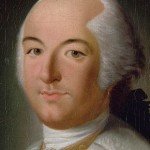 Philippe, Duke of Orléans (1747-1793) was a minor Bourbon royal, a cousin to Louis XVI, a successor to the royal throne and a supporter of the revolution. Orléans was one of France’s wealthiest men with an annual income exceeding seven million livres. Despite his wealth, Orléans had remarkably progressive political views. He was a moderate reformer who criticised the financial waste and mismanagement of his cousin’s government. The duke was not well educated but spoke with high praise of the works of Montesquieu and Rousseau. He was a frequent visitor to England, whose culture and constitutional monarchy he greatly admired. Orléans despised Marie Antoinette but enjoyed a civil relationship with Louis XVI, however there is little doubt that the duke coveted the throne and saw himself as an alternative king, albeit a constitutional monarch.
Philippe, Duke of Orléans (1747-1793) was a minor Bourbon royal, a cousin to Louis XVI, a successor to the royal throne and a supporter of the revolution. Orléans was one of France’s wealthiest men with an annual income exceeding seven million livres. Despite his wealth, Orléans had remarkably progressive political views. He was a moderate reformer who criticised the financial waste and mismanagement of his cousin’s government. The duke was not well educated but spoke with high praise of the works of Montesquieu and Rousseau. He was a frequent visitor to England, whose culture and constitutional monarchy he greatly admired. Orléans despised Marie Antoinette but enjoyed a civil relationship with Louis XVI, however there is little doubt that the duke coveted the throne and saw himself as an alternative king, albeit a constitutional monarch.
In 1787 Orléans served as a member of the Assembly of Notables, where he expressed strong criticisms of the Ancien Régime and supported calls for change. This made him very popular with the people but he was loathed by the royals, particularly Antoinette, who considered him a class traitor. As the revolution intensified in 1789, so did the duke’s involvement. Orléans campaigned extensively for the Estates General, hiring Jacques Brissot and Pierre de Laclos as political advisers. He hosted radical political clubs and salons at his Paris home, allowing them to gather, debate and produce pamphlets unmolested by royal authorities. Orléans later joined the Jacobin Club and, in 1791, renounced his privileged titles, changing his name to Citoyen Philippe Égalité. He sat in both the National Constituent Assembly and the National Convention, and in 1793 voted for the king’s execution. Four months later after Louis XVI’s execution, Philippe was himself arrested on suspicion of conspiring with counter-revolutionary émigrés. He was tried and executed in November 1793.
Information and resources on this page are © Alpha History 2018. Content on this page may not be copied, republished or redistributed without the express permission of Alpha History. For more information please refer to our Terms of Use.
